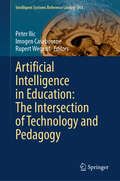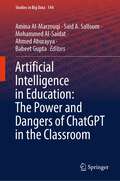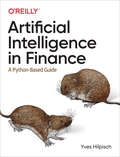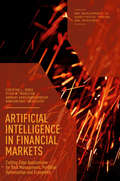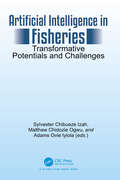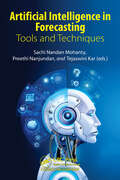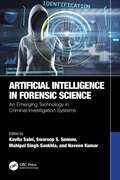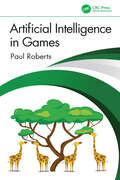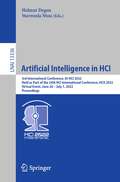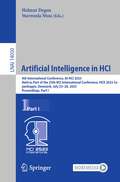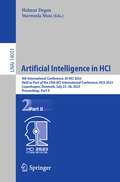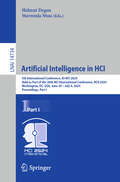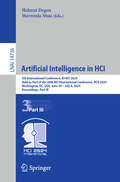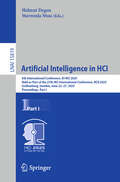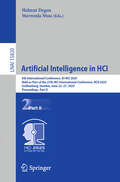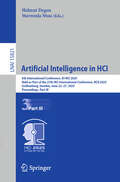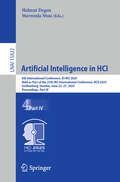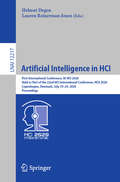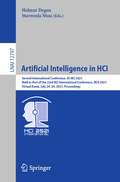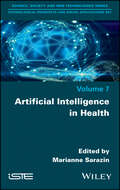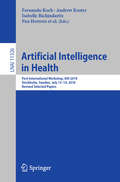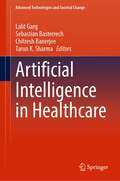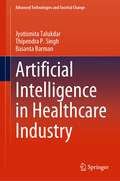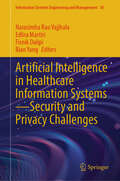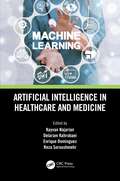- Table View
- List View
Artificial Intelligence in Education: The Intersection of Technology and Pedagogy (Intelligent Systems Reference Library #261)
by Rupert Wegerif Peter Ilic Imogen CasebourneThis book offers a multidisciplinary perspective on the ways in which the careful integration of AI might enhance learning outcomes. By inviting dialogue between engineering (what is possible) and pedagogy (what might be desirable), the book offers a holistic view of AI's potential for education. Offering both case studies of practical implementation and pedagogically informed frameworks, it focuses on appropriately integrating technology for educational benefit, presenting a uniquely broad view. The contributors, who are both educators and technically proficient, bring insights into teaching and assessment approaches, research questions, and technological affordances or constraints. Essential for researchers, educators, and policymakers navigating the rapidly evolving educational technology landscape as AI becomes increasingly prevalent in every aspect of life.
Artificial Intelligence in Education: The Power and Dangers of ChatGPT in the Classroom (Studies in Big Data #144)
by Amina Al-Marzouqi Said A. Salloum Mohammed Al-Saidat Ahmed Aburayya Babeet GuptaThis book aims to bring together a collection of innovative and cutting-edge research that addresses the various challenges in the application and theoretical aspects of ChatGPT in education. ChatGPT is a large language model developed by OpenAI that has the ability to generate human-like text based on a prompt. This has significant potential for use in the field of education, as it allows for the creation of personalized, interactive learning experiences, automating assessment and grading, and more. In e-learning, ChatGPT is used to provide instant feedback and support to students, as well as generate interactive conversations in the target language for language learning. It is also integrated with existing learning management systems and educational technology platforms to enhance their capabilities. In research, ChatGPT is used for natural language processing and sentiment analysis to gather insights on student learning experiences and educational outcomes. However, it is important to note that there are also ethical and privacy concerns that come with using language models like ChatGPT in education, such as data protection and the potential for bias. Overall, the use of ChatGPT in education has the potential to revolutionize the way we learn, teach, and access information. The book seeks to publish original manuscripts that cover a broad range of topics, from the development of new chatbot technologies and their integration into the classroom, to the examination of the ethical and pedagogical implications of these systems. By compiling the latest developments in the field and highlighting new areas for exploration, this book provides valuable insights and perspectives for researchers, educators, and practitioners working in the field of ChatGPT and education. The ultimate goal is to advance the understanding of ChatGPT and its role in education and to promote its effective and responsible use in the classroom and beyond.
Artificial Intelligence in Finance: A Python-based Guide
by Yves HilpischThe widespread adoption of AI and machine learning is revolutionizing many industries today. Once these technologies are combined with the programmatic availability of historical and real-time financial data, the financial industry will also change fundamentally. With this practical book, you'll learn how to use AI and machine learning to discover statistical inefficiencies in financial markets and exploit them through algorithmic trading.Author Yves Hilpisch shows practitioners, students, and academics in both finance and data science practical ways to apply machine learning and deep learning algorithms to finance. Thanks to lots of self-contained Python examples, you'll be able to replicate all results and figures presented in the book.In five parts, this guide helps you:Learn central notions and algorithms from AI, including recent breakthroughs on the way to artificial general intelligence (AGI) and superintelligence (SI)Understand why data-driven finance, AI, and machine learning will have a lasting impact on financial theory and practiceApply neural networks and reinforcement learning to discover statistical inefficiencies in financial marketsIdentify and exploit economic inefficiencies through backtesting and algorithmic trading--the automated execution of trading strategiesUnderstand how AI will influence the competitive dynamics in the financial industry and what the potential emergence of a financial singularity might bring about
Artificial Intelligence in Financial Markets: Cutting Edge Applications for Risk Management, Portfolio Optimization and Economics (New Developments in Quantitative Trading and Investment)
by Christian L. Dunis, Peter W. Middleton, Andreas Karathanasopolous and Konstantinos TheofilatosAs technology advancement has increased, so to have computational applications for forecasting, modelling and trading financial markets and information, and practitioners are finding ever more complex solutions to financial challenges. Neural networking is a highly effective, trainable algorithmic approach which emulates certain aspects of human brain functions, and is used extensively in financial forecasting allowing for quick investment decision making. This book presents the most cutting-edge artificial intelligence (AI)/neural networking applications for markets, assets and other areas of finance. Split into four sections, the book first explores time series analysis for forecasting and trading across a range of assets, including derivatives, exchange traded funds, debt and equity instruments. This section will focus on pattern recognition, market timing models, forecasting and trading of financial time series. Section II provides insights into macro and microeconomics and how AI techniques could be used to better understand and predict economic variables. Section III focuses on corporate finance and credit analysis providing an insight into corporate structures and credit, and establishing a relationship between financial statement analysis and the influence of various financial scenarios. Section IV focuses on portfolio management, exploring applications for portfolio theory, asset allocation and optimization. This book also provides some of the latest research in the field of artificial intelligence and finance, and provides in-depth analysis and highly applicable tools and techniques for practitioners and researchers in this field.
Artificial Intelligence in Fisheries: Transformative Potentials and Challenges
by Sylvester Chibueze Izah Matthew Chidozie Ogwu Adams Ovie IyiolaArtificial Intelligence in Fisheries delves into the transformative role of AI in the fisheries and aquaculture. It provides a comprehensive overview of how AI applications—from fish stock assessment and environmental monitoring to sustainable aquaculture and policy development—are revolutionizing the sector. By enhancing data-driven decision-making, increasing efficiency, and addressing ecological challenges, this book serves as a practical guide for scientists, industry professionals, and policymakers. With contributions from experts, scholars and practitioners, the book brings together theoretical foundations and real-world applications to explore AI's potential to drive sustainable practices in fisheries. Readers will gain insight into how AI can help optimize resource use, protect endangered species, and promote responsible fishing practices. It offers valuable perspectives and actionable strategies to support the future of sustainable fisheries and aquaculture.
Artificial Intelligence in Forecasting: Tools and Techniques
by Sachi Nandan Mohanty Preethi Nanjundan Tejaswini KarForecasting deals with the uncertainty of the future. To be effective, forecasting models should be timely available, accurate, reliable, and compatible with existing database. Accurate projection of the future is of vital importance in supply chain management, inventory control, economic condition, technology, growth trend, social change, political change, business, weather forecasting, stock price prediction, earthquake prediction, etc. AI powered tools and techniques of forecasting play a major role in improving the projection accuracy. The software running AI forecasting models use machine learning to improve accuracy. The software can analyse the past data and can make better prediction about the future trends with higher accuracy and confidence that favours for making proper future planning and decision. In other words, accurate forecasting requires more than just the matching of models to historical data.The book covers the latest techniques used by managers in business today, discover the importance of forecasting and learn how it's accomplished. Readers will also be familiarised with the necessary skills to meet the increased demand for thoughtful and realistic forecasts.
Artificial Intelligence in Forensic Science: An Emerging Technology in Criminal Investigation Systems
by Naveen Kumar Kavita Saini Mahipal Singh Sankhla Swaroop S. SononeArtificial Intelligence in Forensic Science addresses the current and emerging opportunities being utilized to apply modern Artificial Intelligence (AI) technologies to current forensic and investigation practices. The book also showcases the increasing benefits of AI where and when it can be applied to various techniques and forensic disciplines. The increasing rate of sophisticated crimes has increased the opportunity and need for the forensic field to explore a variety of emerging technologies to counter criminals—and AI is no exception. There are many current investigative challenges that, with ingenuity and application, can be helped with the application of AI, especially in the digital forensic and cyber-crime arena. The book also explains many practical studies that have been carried out to test AI technologies in crime detection, uncovering evidence, and identifying perpetrators. In the last decade, the use of AI has become common in many fields and now is an ideal time to look at the various ways AI can be integrated into judicial, forensic, and criminal cases to better collect and analyze evidence, thereby improving outcomes.
Artificial Intelligence in Games
by Paul RobertsThis book covers all the necessary topics that a professional game AI programmer needs to know, from math and steering behaviours to terrain analysis, pathfinding and decision-making. Written to be easily accessible, each topic is accompanied by an example game that allows the reader to add their own code to see the effects their changes have. Each chapter is split into two parts. The first part covers the necessary theory in a friendly, conversational manner, using visual examples and fictional game scenarios to give additional context. The second part is a coding tutorial in C# for the topic at hand. Each chapter has its own example game available to download, written in C# in the Unity Game Engine. This book will be suitable for students and aspiring games programmers looking to gain a grounding in game AI techniques.
Artificial Intelligence in HCI: 3rd International Conference, AI-HCI 2022, Held as Part of the 24th HCI International Conference, HCII 2022, Virtual Event, June 26 – July 1, 2022, Proceedings (Lecture Notes in Computer Science #13336)
by Helmut Degen Stavroula NtoaThis book constitutes the refereed proceedings of the Third International Conference on Artificial Intelligence in HCI, AI-HCI 2022, which was held as part of HCI International 2022 and took place virtually during June 26 – July 1, 2022. A total of 1271 papers and 275 posters included in the 39 HCII 2022 proceedings volumes. AI-HCI 2022 includes a total of 39 papers; they are grouped thematically as follows: Human-Centered AI; Explainable and Trustworthy AI; UX Design and Evaluation of AI-Enabled Systems; AI Applications in HCI.
Artificial Intelligence in HCI: 4th International Conference, AI-HCI 2023, Held as Part of the 25th HCI International Conference, HCII 2023, Copenhagen, Denmark, July 23–28, 2023, Proceedings, Part I (Lecture Notes in Computer Science #14050)
by Helmut Degen Stavroula NtoaThis double volume book set constitutes the refereed proceedings of 4th International Conference, AI-HCI 2023, held as part of the 25th International Conference, HCI International 2023, which was held virtually in Copenhagen, Denmark in July 2023.The total of 1578 papers and 396 posters included in the HCII 2023 proceedings was carefully reviewed and selected from 7472 submissions. The first volume focuses on topics related to Human-Centered Artificial Intelligence, explainability, transparency and trustworthiness, ethics and fairness, as well as AI-supported user experience design. The second volume focuses on topics related to AI for language, text, and speech-related tasks, human-AI collaboration, AI for decision-support and perception analysis, and innovations in AI-enabled systems.
Artificial Intelligence in HCI: 4th International Conference, AI-HCI 2023, Held as Part of the 25th HCI International Conference, HCII 2023, Copenhagen, Denmark, July 23–28, 2023, Proceedings, Part II (Lecture Notes in Computer Science #14051)
by Helmut Degen Stavroula NtoaThis double volume book set constitutes the refereed proceedings of 4th International Conference, AI-HCI 2023, held as part of the 25th International Conference, HCI International 2023, which was held virtually in Copenhagen, Denmark in July 2023.The total of 1578 papers and 396 posters included in the HCII 2023 proceedings was carefully reviewed and selected from 7472 submissions. The first volume focuses on topics related to Human-Centered Artificial Intelligence, explainability, transparency and trustworthiness, ethics and fairness, as well as AI-supported user experience design. The second volume focuses on topics related to AI for language, text, and speech-related tasks, human-AI collaboration, AI for decision-support and perception analysis, and innovations in AI-enabled systems.
Artificial Intelligence in HCI: 5th International Conference, AI-HCI 2024, Held as Part of the 26th HCI International Conference, HCII 2024, Washington, DC, USA, June 29 – July 4, 2024, Proceedings, Part I (Lecture Notes in Computer Science #14734)
by Helmut Degen Stavroula NtoaThe three-volume book set LNAI 14734, 14735, and 14736 constitutes the refereed proceedings of 5th International Conference on Artificial Intelligence in HCI, AI-HCI 2024, held as part of the 26th International Conference, HCI International 2024, which took place in Washington, DC, USA, during June 29-July 4, 2024. The total of 1271 papers and 309 posters included in the HCII 2024 proceedings was carefully reviewed and selected from 5108 submissions. The AI-HCI 2024 proceedings were organized in the following topical sections: Part I: Human-centered artificial intelligence; explainability and transparency; AI systems and frameworks in HCI; Part II: Ethical considerations and trust in AI; enhancing user experience through AI-driven technologies; AI in industry and operations; Part III: Large language models for enhanced interaction; advancing human-robot interaction through AI; AI applications for social impact and human wellbeing.
Artificial Intelligence in HCI: 5th International Conference, AI-HCI 2024, Held as Part of the 26th HCI International Conference, HCII 2024, Washington, DC, USA, June 29–July 4, 2024, Proceedings, Part III (Lecture Notes in Computer Science #14736)
by Helmut Degen Stavroula NtoaThe three-volume book set LNAI 14734, 14735, and 14736 constitutes the refereed proceedings of 5th International Conference on Artificial Intelligence in HCI, AI-HCI 2024, held as part of the 26th International Conference, HCI International 2024, which took place in Washington, DC, USA, during June 29-July 4, 2024. The total of 1271 papers and 309 posters included in the HCII 2024 proceedings was carefully reviewed and selected from 5108 submissions. The AI-HCI 2024 proceedings were organized in the following topical sections: Part I: Human-centered artificial intelligence; explainability and transparency; AI systems and frameworks in HCI; Part II: Ethical considerations and trust in AI; enhancing user experience through AI-driven technologies; AI in industry and operations; Part III: Large language models for enhanced interaction; advancing human-robot interaction through AI; AI applications for social impact and human wellbeing.
Artificial Intelligence in HCI: 6th International Conference, AI-HCI 2025, Held as Part of the 27th HCI International Conference, HCII 2025, Gothenburg, Sweden, June 22–27, 2025, Proceedings, Part I (Lecture Notes in Computer Science #15819)
by Helmut Degen Stavroula NtoaThe four-volume set LNAI 15819–15822 constitutes the thoroughly refereed proceedings of the 6th International Conference on Artificial Intelligence in HCI, AI-HCI 2025, held as part of the 27th International Conference, HCI International 2025, which took place in Gothenburg, Sweden, June 22-17, 2025. The total of 1430 papers and 355 posters included in the HCII 2025 proceedings was carefully reviewed and selected from 7972 submissions. The papers have been organized in topical sections as follows: Part I: Trust and Explainability in Human-AI Interaction; User Perceptions, Acceptance, and Engagement with AI; UX and Socio-Technical Considerations in AI Part II: Bias Mitigation and Ethics in AI Systems; Human-AI Collaboration and Teaming; Chatbots and AI-Driven Conversational Agents; AI in Language Processing and Communication. Part III: Generative AI in HCI; Human-LLM Interactions and UX Considerations; Everyday AI: Enhancing Culture, Well-Being, and Urban Living. Part IV: AI-Driven Creativity: Applications and Challenges; AI in Industry, Automation, and Robotics; Human-Centered AI and Machine Learning Technologies.
Artificial Intelligence in HCI: 6th International Conference, AI-HCI 2025, Held as Part of the 27th HCI International Conference, HCII 2025, Gothenburg, Sweden, June 22–27, 2025, Proceedings, Part II (Lecture Notes in Computer Science #15820)
by Helmut Degen Stavroula NtoaThe four-volume set LNAI 15819–15822 constitutes the thoroughly refereed proceedings of the 6th International Conference on Artificial Intelligence in HCI, AI-HCI 2025, held as part of the 27th International Conference, HCI International 2025, which took place in Gothenburg, Sweden, June 22-17, 2025. The total of 1430 papers and 355 posters included in the HCII 2025 proceedings was carefully reviewed and selected from 7972 submissions. The papers have been organized in topical sections as follows: Part I: Trust and Explainability in Human-AI Interaction; User Perceptions, Acceptance, and Engagement with AI; UX and Socio-Technical Considerations in AI Part II: Bias Mitigation and Ethics in AI Systems; Human-AI Collaboration and Teaming; Chatbots and AI-Driven Conversational Agents; AI in Language Processing and Communication. Part III: Generative AI in HCI; Human-LLM Interactions and UX Considerations; Everyday AI: Enhancing Culture, Well-Being, and Urban Living. Part IV: AI-Driven Creativity: Applications and Challenges; AI in Industry, Automation, and Robotics; Human-Centered AI and Machine Learning Technologies.
Artificial Intelligence in HCI: 6th International Conference, AI-HCI 2025, Held as Part of the 27th HCI International Conference, HCII 2025, Gothenburg, Sweden, June 22–27, 2025, Proceedings, Part III (Lecture Notes in Computer Science #15821)
by Helmut Degen Stavroula NtoaThe four-volume set LNAI 15819–15822 constitutes the thoroughly refereed proceedings of the 6th International Conference on Artificial Intelligence in HCI, AI-HCI 2025, held as part of the 27th International Conference, HCI International 2025, which took place in Gothenburg, Sweden, June 22-17, 2025. The total of 1430 papers and 355 posters included in the HCII 2025 proceedings was carefully reviewed and selected from 7972 submissions. The papers have been organized in topical sections as follows: Part I: Trust and Explainability in Human-AI Interaction; User Perceptions, Acceptance, and Engagement with AI; UX and Socio-Technical Considerations in AI Part II: Bias Mitigation and Ethics in AI Systems; Human-AI Collaboration and Teaming; Chatbots and AI-Driven Conversational Agents; AI in Language Processing and Communication. Part III: Generative AI in HCI; Human-LLM Interactions and UX Considerations; Everyday AI: Enhancing Culture, Well-Being, and Urban Living. Part IV: AI-Driven Creativity: Applications and Challenges; AI in Industry, Automation, and Robotics; Human-Centered AI and Machine Learning Technologies.
Artificial Intelligence in HCI: 6th International Conference, AI-HCI 2025, Held as Part of the 27th HCI International Conference, HCII 2025, Gothenburg, Sweden, June 22–27, 2025, Proceedings, Part IV (Lecture Notes in Computer Science #15822)
by Helmut Degen Stavroula NtoaThe four-volume set LNAI 15819–15822 constitutes the thoroughly refereed proceedings of the 6th International Conference on Artificial Intelligence in HCI, AI-HCI 2025, held as part of the 27th International Conference, HCI International 2025, which took place in Gothenburg, Sweden, June 22-17, 2025. The total of 1430 papers and 355 posters included in the HCII 2025 proceedings was carefully reviewed and selected from 7972 submissions. The papers have been organized in topical sections as follows: Part I: Trust and Explainability in Human-AI Interaction; User Perceptions, Acceptance, and Engagement with AI; UX and Socio-Technical Considerations in AI Part II: Bias Mitigation and Ethics in AI Systems; Human-AI Collaboration and Teaming; Chatbots and AI-Driven Conversational Agents; AI in Language Processing and Communication. Part III: Generative AI in HCI; Human-LLM Interactions and UX Considerations; Everyday AI: Enhancing Culture, Well-Being, and Urban Living. Part IV: AI-Driven Creativity: Applications and Challenges; AI in Industry, Automation, and Robotics; Human-Centered AI and Machine Learning Technologies.
Artificial Intelligence in HCI: First International Conference, AI-HCI 2020, Held as Part of the 22nd HCI International Conference, HCII 2020, Copenhagen, Denmark, July 19–24, 2020, Proceedings (Lecture Notes in Computer Science #12217)
by Lauren Reinerman-Jones Helmut DegenThis book constitutes the refereed proceedings of the First International Conference on Artificial Intelligence in HCI, AI-HCI 2020, held as part of the 22nd International Conference on Human-Computer Interaction, HCII 2020, in July 2020. The conference was planned to be held in Copenhagen, Denmark, but had to change to a virtual conference mode due to the COVID-19 pandemic. The conference presents results from academic and industrial research, as well as industrial experiences, on the use of Artificial Intelligence technologies to enhance Human-Computer Interaction. From a total of 6326 submissions, a total of 1439 papers and 238 posters has been accepted for publication in the HCII 2020 proceedings. The 30 papers presented in this volume were organized in topical sections as follows: Human-Centered AI; and AI Applications in HCI.pical sections as follows: Human-Centered AI; and AI Applications in HCI.
Artificial Intelligence in HCI: Second International Conference, AI-HCI 2021, Held as Part of the 23rd HCI International Conference, HCII 2021, Virtual Event, July 24–29, 2021, Proceedings (Lecture Notes in Computer Science #12797)
by Helmut Degen Stavroula NtoaThis book constitutes the refereed proceedings of the Second International Conference on Artificial Intelligence in HCI, AI-HCI 2021, which was held as part of HCI International 2021 and took place virtually during July 24-29, 2021.The total of 1276 papers and 241 posters included in the 39 HCII 2021 proceedings volumes was carefully reviewed and selected from 5222 submissions. The papers included in this volume were organized in topical sections as follows: Ethics, trust and explainability; human-centered AI; AI applications in HCI; and AI applications in smart environments.
Artificial Intelligence in Health
by Marianne SarazinUndeniable, inescapable, exhilarating and breaking free from the exclusive domain of science, artificial intelligence has become our main preoccupation. A major generator of new mathematical thinking, AI is the result of easy access to information and data, as facilitated by computer technology. Big Data has come to be seen as an unlimited source of knowledge, the use of which is still being fully explored, but its industrialization has swiftly followed in the footsteps of mathematicians; today's tools are increasingly designed to replace human beings, which comes with social and philosophical consequences. Drawing on examples of scientific work and the insights of experts, this book offers food for thought on the consequences and future of AI technology in education, health, the workplace and aging.
Artificial Intelligence in Health: First International Workshop, AIH 2018, Stockholm, Sweden, July 13-14, 2018, Revised Selected Papers (Lecture Notes in Computer Science #11326)
by Michael Schumacher Nirmalie Wiratunga David Riaño Richard Lenz Manfred Reichert Annette Ten Teije Fernando Koch Christian Guttmann Andrew Koster Stefania Montani Pau Herrero Sara Montagna Isabelle Bichindaritz Beatriz López Cindy Marling Clare MartinThis book constitutes the refereed post-conference proceedings of the First International Workshop on Artificial Intelligence in Health, AIH 2018, in Stockholm, Sweden, in July 2018. This workshop consolidated the workshops CARE, KRH4C and AI4HC into a single event.The 18 revised full papers included in this volume were carefully selected from the 26 papers accepted for presentation out of 42 initial submissions. The papers present AI technologies with medical applications and are organized in three tracks: agents in healthcare; data science and decision systems in medicine; and knowledge management in healthcare.
Artificial Intelligence in Healthcare (Advanced Technologies and Societal Change)
by Tarun K. Sharma Chitresh Banerjee Lalit Garg Sebastian BasterrechThis book highlights the analytics and optimization issues in healthcare systems, proposes new approaches, and presents applications of innovative approaches in real facilities. In the past few decades, there has been an exponential rise in the application of swarm intelligence techniques for solving complex and intricate problems arising in healthcare. The versatility of these techniques has made them a favorite among scientists and researchers working in diverse areas. The primary objective of this book is to bring forward thorough, in-depth, and well-focused developments of hybrid variants of swarm intelligence algorithms and their applications in healthcare systems.
Artificial Intelligence in Healthcare Industry (Advanced Technologies and Societal Change)
by Jyotismita Talukdar Thipendra P. Singh Basanta BarmanThis book presents a systematic evolution of artificial intelligence (AI), its applications, challenges and solutions in the field of healthcare. The book mainly covers the foundations and various methods of learning in artificial intelligence with its application in healthcare industry. This book provides a comprehensive introduction to data analysis using AI as a tool in the generation, normalization and analysis of healthcare data in association with several evaluation techniques and accuracy measurements. The book is divided into three major sections describing the basic foundations of AI and its associated algorithms, history of artificial intelligence in healthcare, recent developments and several modeling techniques for the same. The last section of the book provides insights into several implementations and methods of evaluation and accuracy prediction for healthcare analysis in AI. Extensive use of data for analysis and prediction using several technologies has transformed the lives of normal people indirectly effecting our process to communicate, learn, work and socialize within the society. Thus, the book also provides an insight into the ethics of AI that is very vital in the process of implementation and evaluation of healthcare data. The book provides an organized analysis to a considerable part of data in a digitized society. In view of this, it covers the theory, methodology, perfection and verification of empirical work for health-related data processing. Particular attention is devoted to in-depth experiments and applications.
Artificial Intelligence in Healthcare Information Systems—Security and Privacy Challenges (Information Systems Engineering and Management #34)
by Narasimha Rao Vajjhala Edlira Martiri Fisnik Dalipi Bian Yang“Artificial Intelligence (AI) in Healthcare Information Systems: Security and Privacy Challenges” offers a deep dive into the integration of AI in healthcare, with a primary focus on addressing the significant security and privacy concerns that arise in this domain. The chapters in this book highlight the transformative potential of AI in diagnosing and predicting diseases, as well as its impact on fields like fetal medicine, but places special emphasis on the need for robust encryption, data protection techniques, and ethical considerations to safeguard sensitive healthcare data. The book also explores global case studies, from India to Kazakhstan, outlining the challenges and prospects of AI adoption in diverse healthcare settings. Readers will gain insights into AI's role in improving patient outcomes while navigating the complexities of data privacy and security. The book is a valuable resource for healthcare professionals, technologists, and policymakers who are focused on implementing AI-driven solutions securely and ethically in healthcare systems.
Artificial Intelligence in Healthcare and Medicine
by Kayvan NajarianThis book provides a comprehensive overview of the recent developments in clinical decision support systems, precision health, and data science in medicine. The book targets clinical researchers and computational scientists seeking to understand the recent advances of artificial intelligence (AI) in health and medicine. Since AI and its applications are believed to have the potential to revolutionize healthcare and medicine, there is a clear need to explore and investigate the state-of-the-art advancements in the field. This book provides a detailed description of the advancements, challenges, and opportunities of using AI in medical and health applications. Over 10 case studies are included in the book that cover topics related to biomedical image processing, machine learning for healthcare, clinical decision support systems, visualization of high dimensional data, data security and privacy, bioinformatics, and biometrics. The book is intended for clinical researchers and computational scientists seeking to understand the recent advances of AI in health and medicine. Many universities may use the book as a secondary training text. Companies in the healthcare sector can greatly benefit from the case studies covered in the book. Moreover, this book also: Provides an overview of the recent developments in clinical decision support systems, precision health, and data science in medicine Examines the advancements, challenges, and opportunities of using AI in medical and health applications Includes 10 cases for practical application and reference Kayvan Najarian is a Professor in the Department of Computational Medicine and Bioinformatics, Department of Electrical Engineering and Computer Science, and Department of Emergency Medicine at the University of Michigan, Ann Arbor. Delaram Kahrobaei is the University Dean for Research at City University of New York (CUNY), a Professor of Computer Science and Mathematics, Queens College CUNY, and the former Chair of Cyber Security, University of York. Enrique Domínguez is a professor in the Department of Computer Science at the University of Malaga and a member of the Biomedical Research Institute of Malaga. Reza Soroushmehr is a Research Assistant Professor in the Department of Computational Medicine and Bioinformatics and a member of the Michigan Center for Integrative Research in Critical Care, University of Michigan, Ann Arbor.
